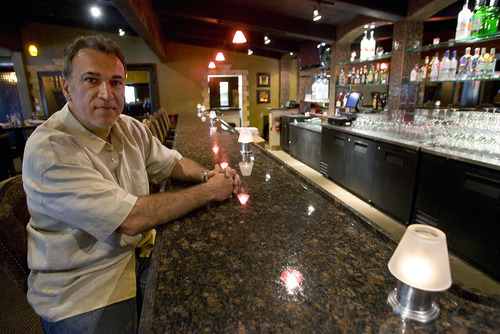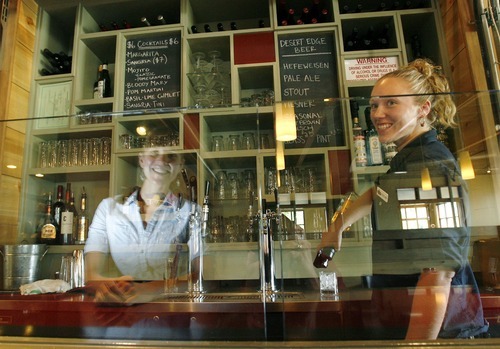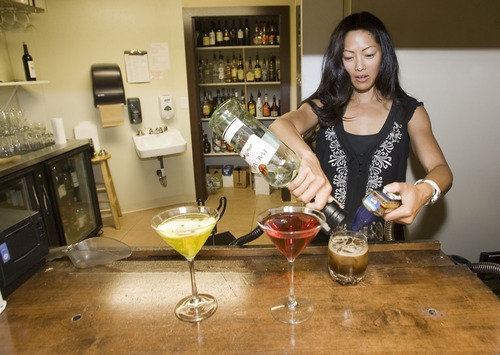This is an archived article that was published on sltrib.com in 2011, and information in the article may be outdated. It is provided only for personal research purposes and may not be reprinted.
Restaurant owners insist Utah's recently enacted law requiring new eateries to erect barriers to hide bartenders from diners is so destructive to business that some establishments are pushing legal boundaries to get out of building them.
And restaurants that are exempt from the law are refusing a collective $1 million in incentives to tear down their existing bars. During the past two years, not a single owner has applied for awards of up to $30,000, which lawmakers set aside to help pay the costs of erecting barriers to hide bartenders and open bottles of liquor from public view, dubbed Zion Walls.
The incentives, offered as state credits toward liquor purchases, aren't worth the competitive advantages that grandfathered bars give restaurants over newer eateries that must erect barriers, many owners say.
"Our customers like our bar area, it contributes to the ambience here," said Kenny Lundin, manager of Stella Grill at 4291 S. 900 East in Murray. "Diners like to see bartenders shake a martini or pour a glass of wine, instead of servers bringing drinks from somewhere out of a back room. Many diners are uneasy about what goes into their drink in that back room."
—
Competing for permits • As an out, instead of settling for a restaurant liquor license new eateries are lining up for club permits, which have no prohibitions against bars or waiting areas where diners may have a drink while waiting for a table. But there's a bottleneck for available club licenses, whose numbers are based on the state's population. For instance, 15 owners applied for a single permit that became available in May, and this month, 22 applicants are vying for a license that's expected to be surrendered by a establishment that has gone out of business.
The desperation is even driving some to offer licenses for a price, which could become commonplace when the practice is allowed by state law in 2012, creating bidding wars, and even corruption.
Fears surrounding portions of the law were so acute that in March the state's liquor-control commissioners took an unprecedented but unanimous step in asking Gov. Gary Herbert to veto the entire liquor package. He signed the legislation.
Said Commissioner Richard Sperry: "If licenses can be sold, it opens the potential for discrimination against small-business and mom-and-pop operations to be priced out of the market. And there could be pressure or undue influence on other small owners to sell."
The barrier requirement for new eateries also may be discouraging national chains from opening new locations in Utah. Only two that serve liquor have opened in Utah since the law went into effect, California Pizza Kitchen at Fashion Place Mall and NYPD Pizza in Murray. Neither has bars comparable to a Chili's or the Cheesecake Factory, the two eateries some lawmakers publicly criticized for blurring the line between a bar and a restaurant.
The requirement for a Zion Wall was not a big deal for NYPD Pizza. Spokeswoman Mallysa Byrnes said each franchise is distinctive, but most do not have bars, and those that do have small counters. The chain, headquartered in Orlando, Fla., has 13 restaurants in Utah, Arkansas and Florida.
—
Unpopular change • But many in the hospitality industry and elsewhere think the laws have had a chilling effect. "Our lawmakers have a penchant to monkey with things that aren't broken," said attorney Rick Golden, who has represented eateries applying for licenses. "What will happen is that people coming to Utah to open hotels or restaurants or to do business are going to think twice when they understand what the laws require of them. This is a horrible disservice to our state."
Despite the uproar in the commercial real estate industry and elsewhere, Senate President Michael Waddoups said no one has approached him, voicing concerns over the barrier law that he had pushed.
"We need some polling or scientific research before we change anything as sensitive as this," he said. "We will need much more information other than anecdotal stories."
The new barriers are a more draconian version of the smaller glass partitions, dubbed Zion Curtains, that for years had separated diners from alcoholic beverages. In 2009 lawmakers did away with the partitions placed atop bar counters. But at the same time, they mandated that restaurants opening after January 2010 build back rooms, or a "solid, opaque, permanent structural barrier," so that bartenders could not be seen in an eatery's dining room, lobby or staging and areas.
The Zion Curtain and Zion Wall nicknames are a reference to Utah as the Mormon Zion, and they allude to The Church of Jesus Christ of Latter-day Saints' influence over the state's liquor laws.
When the landmark legislation went into effect two years ago, employees at the Stella restaurant had only to unscrew eight bolts to get rid of the small glass partition at the restaurant's eight-seat counter at the front entrance. At the time, Stella was among 360 of the 774 restaurants licensed to serve liquor that had grandfathered bars.
The new barrier law was passed after Waddoups, R-Taylorsville, directed liquor control commissioners to tighten rules so that diners would not be able to see bartenders behind the old glass partitions at restaurants. But commissioners said the law was so convoluted that they couldn't come up with a way to comply.
"People, particularly children, should not be exposed to alcohol in family restaurants," said Waddoups. "Exposure to alcohol encourages drinking, and that can lead to drunk driving and other public safety concerns."
—
Case in point • With that sentiment as a backdrop, Dimitri Golesis, owner of Yorgio's Fine Dining in Holladay, had to build a back room where bartenders mix drinks when he opened last fall at 6121 S. Highland Drive. Few customers bother to sit at the 26-foot counter because bartenders are not allowed to work there. Golesis says the arrangement has harmed his business. Operations have been reduced from seven days a week to the weekends.
"Customers are unhappy because want to see how their drinks are mixed, and it's difficult to get a bartender because they can't react with customers or get tips when they're hidden away in a back room," he said.
Golesis had originally applied for a club license (for $2,750) so he would not have to build a barrier, but when none were available he had to settle for a restaurant license.
Recently, Golesis said he was contacted about buying a club license from another establishment going out of business in another county. Licenses aren't allowed to be sold on the open market in Utah, but owners are using a loophole to get around the law. New owners simply are buying another business rather than waiting for a permit — but the license goes along with the sale.
Dojo restaurant co-owner Kelly Shiotani says he also was contacted by a middleman about buying a club license before he opened in January at 423 W. 300 South in Salt Lake City.
The asking price topped $50,000, which was too expensive for Shiotani. The Dojo also had to make do with a restaurant license for about $2,000, which resulted in a draft beer system built into a brink wall remaining dry because it is in view of diners.
Earl Dorius, with the Utah Department of Alcoholic Beverage Control, said compliance officers work to ensure that new owners are actually buying the business rather than using the paperwork as a ruse to purchase a license.
"But when there's a scarcity of licenses, people get creative," he added. "We do our best to but sometimes it's not an easy determination when a business is sold."
Even more changes are coming to Utah's liquor law maze. Club licenses are based on the state's population, but because planners used inflated estimates, too many permits have been given out. Starting in July, regulators will be taking back club licenses when businesses are sold until the quota is in line with the population — a process that could take as long as a year. And in July 2012, businesses can legally begin selling their liquor licenses in a move that could add tens of thousands of dollars in costs to open a restaurant or club. In Montana, for example, licenses have been listed for tens of thousands of dollars, up to as much as $1 million.
Although the hospitality industry is opposed to selling licenses, there has been little public opposition because of fears that Utah lawmakers will pass even tougher restrictions, starting with outlawing grandfathered bars.
Jimmy Dublino at Devils Daughter, 533 S. 500 West, Salt Lake City, says he was lucky to get a club license — but it is only a summer seasonal permit. If he can't get a winter permit to continue serving alcohol, he'll have to lay off employees. He could get a tavern permit to serve 3.2 beer but he could not stock other liquor, including wine coolers. If he decides on a restaurant license, he will have to wall off his bar.
"Either way, I'm going to be in trouble."
dawn@sltrib.comTwitter@DawnHouseTrib —
Zion Walls
Restaurants open since January 2010 face liquor restrictions, among them:
Bartenders mixing drinks must be in back rooms, hidden from diners' views.
Open liquor bottles cannot be on public display anywhere in the eatery.
Waiting areas, where drinks are served while diners wait for tables, are banned.
Eateries open before 2010 are exempt unless they expand bars or change locations.







